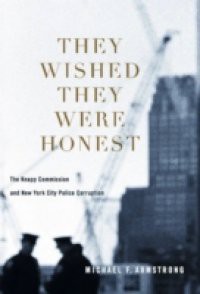Michael Armstrong has spent close to fifty years either defending or prosecuting criminal cases in New York City. His public service has included stints as District Attorney for Queens County, New York, and chief of the Security Frauds Unit in the U.S. Attorneys office in Manhattan. None of his experiences were as tense or as dangerously waged as the Knapp Commissions investigation into police corruption, prompted by the New York Timess report on whistleblower cop Frank Serpico. Based on Armstrongs vivid recollections of this watershed moment in law enforcement accountability, They Wished They Were Honest recreates the struggles and significance of the two-year commission, while crediting the factors that led to its success and the restoration of the NYPDs public image.Serpicos charges against the NYPD encouraged Mayor John Lindsay to appoint prominent attorney Whitman Knapp to head a Citizens Commission on police graft. Overcoming a number of organizational, budgetary, and political hurdles, Armstrong assembled an investigative group of a half dozen lawyers and a dozen agents with backgrounds in federal, not local, law enforcementa professional disconnect that led to numerous setbacks. Yet right when funding was about to run out, the blue wall of silence collapsed. A flamboyant Madame, a corrupt lawyer, a weasly informant, and a super thief cop trapped and turned by the Commission led to sensational and revelatory hearings, which publicly refuted the notion that departmental corruption was limited to only a few rotten apples. Throughout the course of his narrative, Armstrong illuminates police investigative strategy; governmental and departmental political maneuvering; the ethical and philosophical issues of law enforcement; the efficacy (or lack thereof) of the polices public relations efforts; the effectiveness of its training; the psychological and emotional pressures that lead to corruption; and the effects of police criminality on individuals and society. He concludes by discussing the effects of the Knapp and succeeding commissions on police corruption today and the value of permanent outside monitoring bodies, such as the special prosecutors office, formed in response to the Commissions recommendation, as well as the current monitoring commission, of which Armstrong is chairman.

